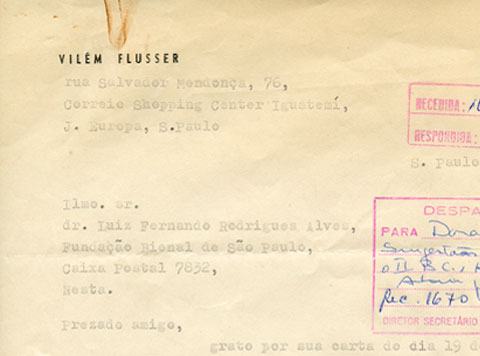
The first document by Flusser to be found in the Archive dated 8 January, 1968. In it, Flusser makes suggestions for the 2nd Symposium on the Integration of Science and Humanism.
On Wednesday, August 15 2012, the first activity of the Reading Room of the 30th Bienal took place and opened a run of enounters, speeches, and poetry slams organized by the Arquivo Bienal and Educativo Bienal teams.
The encounter with philosopher Adriana Gurgel began with some words from her on the title “Poetic Doubt and Awe in the Presence of the World”, bringing in some ideas from Vilém Flusser and other thinkers.
Summing up a long and delightful conversation – which left a lot of people with something to think about – Gurgel spoke of our need to protect doubt, a difficult task within Western thought – full, as it is, of certainties. The intellect is the field of doubt. Given that the intellect is a web composed of phrases, what remains beyond this web is that which cannot be articulated. When not all can be comprehended or articulated by the tongue, the unspeakable is the space from which poetics emerge. In other words, it is necessary to accept the limitations of the intellect in order to allow poetics to exist.

Gurgel has dedicated herself to studying Vilém Flusser’s work, and her studies will deepen throughout the course of a year of the Flusser Archive in Berlin. She concluded her talk with this thought from Flusser:
“Doubt is a state of polyvalent spirit. It may mean the end of a faith, or it may mean the beginning of another. It may even, if taken to an extreme, manifest itself as ‘skepticism’ that is, as a type of inverted faith. In a moderate dose it stimulates thought, but in excess it paralyses all mental activity. Doubt as an intellectual exercise accounts for one of the few pure pleasures, but as a moral experience it is torturous. Doubt, allied with curiosity, is the birthplace of research, therefore all systematic knowledge – but in a distilled state it kills all curiosity and is the end of all knowledge.” Vilém Flusser, Doubt
